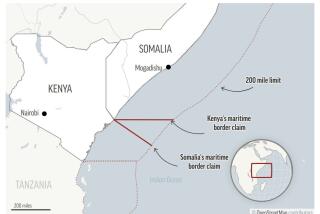U.S. Special Forces May Hunt Somali Warlord : Africa: Official indicates option is part of policy review. He says troops will remain through 1994.
- Share via
WASHINGTON — The Clinton Administration is considering sending a small contingent of Army Special Forces to Somalia to help track down and apprehend fugitive warlord Mohammed Farah Aidid, a senior State Department official involved in U.S. policy on Somalia indicated Tuesday.
The official, Ambassador David H. Shinn, who just completed a two-week inspection of U.N. operations in Somalia, suggested the move is being contemplated as part of an accelerated review of U.S. policy in Somalia ordered by the White House on Monday.
Shinn also told reporters that, although part of the purpose of the new review will be to pinpoint more sharply when U.S. troops might leave Somalia, the Administration still intends to keep American soldiers there at least through 1994.
He added that it is “questionable” whether the U.N. special representative in Somalia, retired U.S. Adm. Jonathan Howe, will be able to realize his goal of completing all U.N. operations in that country by April, 1995, as Howe has predicted.
Shinn’s suggestion that the Administration is considering using Special Forces units in Somalia followed revelations Monday that the White House has ordered a stepped-up review of its Somalia policy after the deaths of four U.S. soldiers there Sunday.
But U.S. officials cautioned that the use of Special Forces was only an option and that the President has not yet decided to take such a step.
At the same time, Shinn and other U.S. officials insisted that the Administration is still “committed to the U.N. mission in Somalia” and is “firmly committed to staying the course” until that mission is accomplished.
He said the United States continues to hope to withdraw most of its logistics forces by the end of this year, with all U.S. troops out of Somalia by the end of 1994. But he hinted that plans to send home by late summer the 1,400-member quick-response force already there may not be achieved.
Neither Shinn nor other top officials would predict just how many Special Forces troops might be sent. But they indicated that the number would be relatively small.
Analysts said a situation such as the one in Mogadishu traditionally would call for between 500 and 1,000 soldiers.
The United States has just under 4,000 troops in Somalia--the 1,400 members of the quick-response force and the remainder soldiers from the 10th Mountain Light Infantry Division of Ft. Drum, N.Y., who are mainly involved in helping with logistics.
The developments came as the U.N. military command in Somalia shut down an airstrip 30 miles outside Mogadishu on Tuesday, contending that it was being used by Aidid to smuggle arms into the country to attack U.N. and U.S. forces.
Roads leading to the strip were barred by Pakistani troops. It was uncertain whether the move marked a first step toward another U.N. crackdown on Aidid’s militia, which is being blamed by officials as the group behind the killing of the U.S. soldiers last weekend.
Meanwhile, hundreds of U.S. soldiers in Mogadishu attended a memorial service Tuesday for the four Americans at the major U.S. military base in the city. Seven other Americans were wounded in Sunday’s attack.
The possibility that the Administration would send Special Forces to help track down and capture Aidid reflects the frustrations that policy-makers are encountering in trying to wrap up U.S. operations in Somalia.
Shinn echoed the contentions of other senior officials that, if the only factor determining how long U.S. troops should stay in Somalia is whether the famine has been relieved, American forces might well have left by now.
However, he conceded, Aidid’s rapidly mounting opposition to the U.N. presence in Somalia--his forces killed 24 Pakistani U.N. peacekeeping troops in June--has thwarted efforts to make Mogadishu secure and has dealt a public relations setback to the United Nations. And Aidid continues to be popular among many Somalis.
Also, Shinn acknowledged that, despite a U.N. warrant for his arrest, Aidid has eluded capture for more than a month, partly by narrowing his contacts with blood relatives and key associates and moving from house to house under cover of night.
As a result, U.S. officials have concluded that the United States cannot possibly consider withdrawing any of its troops from Somalia until Aidid has been captured or at least has been neutralized politically.
But Shinn said the mission of any new forces sent to Somalia would be “to go out into an urban environment where you’re (in) a totally unfamiliar environment and identify and arrest and bring back without a lot of bloodshed someone who lives in that area originally.”
Military experts said the Special Forces likely to be sent in under such a proposal would be “counterinsurgency” and “indigenous direct action” units specially trained to try to undermine Aidid’s power inside his clan, making him more vulnerable to capture.
Experts cautioned, however, that such operations usually are considered long-term, involving months and possibly even years, rather than simply days or weeks.
“This isn’t something they can come in and do quickly,” one said. “It involves the hearts and minds.”
Military experts said that, besides actually arresting Aidid, such units also would try to undermine his credibility by convincing his followers that he no longer is a serious leader.
“They’ll try to marginalize him,” one analyst said.
However, military experts said that one potential obstacle to the use of such forces is that the peacekeeping operation in Somalia is run by the United Nations, not the United States, and U.N. officials may not be willing to give the units the latitude they need to do the job.
“It’s only a good idea if it can be done under the proper political direction and leadership, and that’s where we could get into a big problem,” one veteran Special Forces officer said. “The rules of engagement would be trickier under the U.N.”
More to Read
Sign up for Essential California
The most important California stories and recommendations in your inbox every morning.
You may occasionally receive promotional content from the Los Angeles Times.













